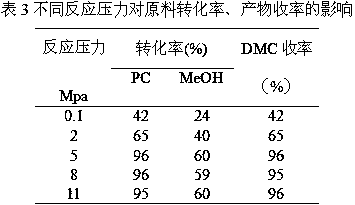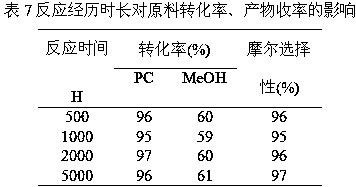Method for synthesis of symmetrical carbonate and co-production of 1,2-propylene glycol
A technology of propylene glycol and propylene carbonate, applied in the direction of organic carbonate preparation, carbonate/haloformate preparation, chemical instruments and methods, etc., can solve the problems of increased operating cost, low conversion rate of reactants and low product selectivity, High energy consumption and other issues
- Summary
- Abstract
- Description
- Claims
- Application Information
AI Technical Summary
Problems solved by technology
Method used
Image
Examples
preparation example Construction
[0064] 1. Preparation method of mesoporous molecular sieve carrier:
[0065] In the present invention, orderly acid-base treatment is carried out on different carriers, and finally the molecular sieve carrier with the compound pore structure of mesoporous and micropores is prepared by high-temperature roasting. The purpose of the acid treatment is to remove the Al in the molecular sieve framework, so as to realize pore formation. The main function of the alkali treatment is to remove the Si in the molecular sieve framework to make the molecular sieve form a mesoporous structure. The preparation process includes the following steps:
[0066] 1) Dealumination: Add a certain mass of M-S carrier to a certain volume of acidic solution with a concentration of 0.11 mol / L, then stir and reflux in an oil bath at 100°C for 6 h, then filter, wash, and dry at 120°C for 8 h. The dealuminated M-S-DAl carrier is obtained.
[0067] 2) Desiliconization: Add the M-S-DAl carrier prepared in pro...
Embodiment 1
[0100] In the still of 50L slurry bed reactor, reaction pressure 2MPa, reaction raw material propylene carbonate: methyl alcohol=1:3, drop into each 1.2 kg of the basic catalyst that above-mentioned preparation method obtains respectively, the total volume of reaction solution is 40 L. The reaction was carried out with mechanical stirring, and the reaction temperature was 100°C. After 10 hours of reaction, samples were taken for chromatographic analysis and calculation. The conversion rate of raw materials and the yield of products are shown in Table 1.
[0101]
[0102] The reaction is catalyzed by a basic catalyst, and the reaction product is a single dimethyl carbonate and 1,2-propanediol. In addition to the generation of dimethyl carbonate (DMC) in the above table, a large amount of 1,2-propanediol is generated. Since 1,2-propanediol is derived from propylene carbonate (PC), if the product selectivity is calculated from propylene carbonate, 1 , The selectivity to 2-prop...
Embodiment 2
[0104] In a 50L slurry bed reactor, the reaction pressure is 2MPa, the reaction raw material propylene carbonate: various alcohols = 1:3, and 15%BaO-5%Cr 2 o 3 -3%La 2 o 3 / Zr-meso-ZSM-35 catalyst 1.2kg, the total volume of the reaction solution is 40 L. The reaction was mechanically stirred, the reaction temperature was 100°C, and after 10 hours of reaction, samples were taken for chromatographic analysis and calculation.
[0105]
[0106] It can be seen from Table 2 that when different alcohols are used as reaction raw materials to synthesize symmetrical carbonate esters, the reaction results are quite different. As the R group becomes more complex, the conversion rate of ROH gradually decreases, and the yield of symmetrical carbonate esters also gradually decreases. . The reason is that as the R group becomes more complex, the steric hindrance of ROH becomes larger, and it is difficult for the R group to approach propylene carbonate and replace it.
PUM
 Login to View More
Login to View More Abstract
Description
Claims
Application Information
 Login to View More
Login to View More - Generate Ideas
- Intellectual Property
- Life Sciences
- Materials
- Tech Scout
- Unparalleled Data Quality
- Higher Quality Content
- 60% Fewer Hallucinations
Browse by: Latest US Patents, China's latest patents, Technical Efficacy Thesaurus, Application Domain, Technology Topic, Popular Technical Reports.
© 2025 PatSnap. All rights reserved.Legal|Privacy policy|Modern Slavery Act Transparency Statement|Sitemap|About US| Contact US: help@patsnap.com



